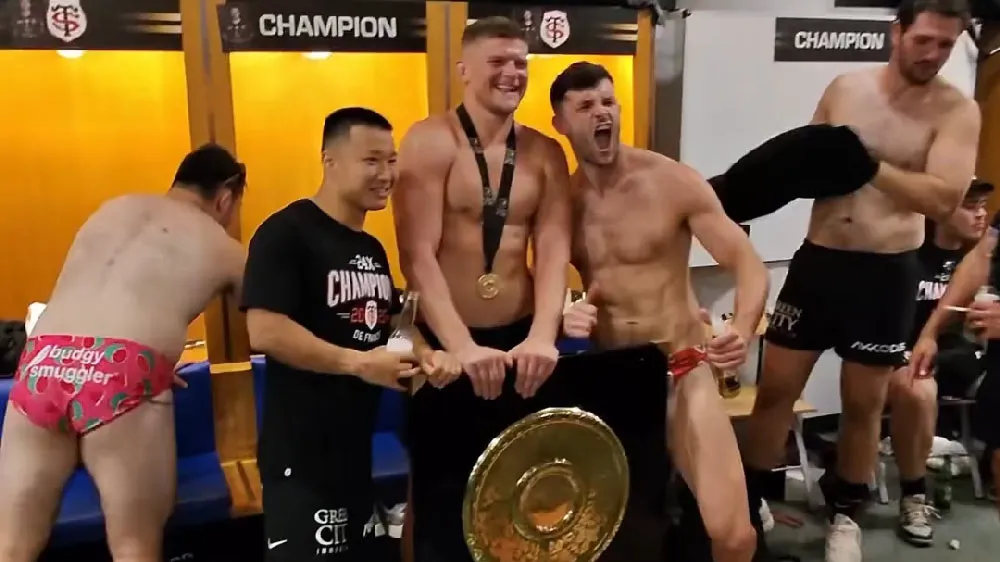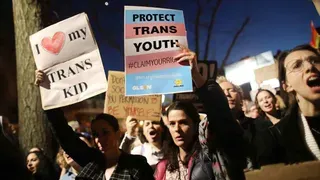January 23, 2009
'No Name-Calling Week' Comes to Schools, Promotes Safe Environment
Kilian Melloy READ TIME: 5 MIN.
A group dedicated to ensuring that schools are safe for all students regardless of sexual orientation has organized a "No Name-Calling Week" for the sixth year in a row.
The Gay, Lesbian, Straight Education Network (GLSEN) announced in a Jan. 22 press release that for the sixth consecutive year, elementary and middle schools around the country would participate in the week-long event, designed to educate students about the harmful effects of name-calling and other forms of harassment.
The release stated that "thousands" of schools would be taking part in the program, which is aimed at elementary and middle-school students from the fifth through the eighth grades.
GLSEN is joined in the effort to educate students about all forms of name-calling and bullying by Simon and Schuster Children's Publishing, as well as by a coalition of about 50 organizations geared toward education and youth services.
The release quoted the organization's executive director, Dr. Eliza Byard, who said, "Name-calling and bullying are creating unsafe environments in America's schools, which is hindering student performance."
Continued Dr. Byard, "No Name-Calling Week is an opportunity for schools to engage their students in discussions about understanding differences and treating everyone with respect.
"Such a simple message has a profound impact."
GLSEN has made materials such as lesson plans and other resources available for educators available online.
Parents interested in organizing participation of their children's schools are also provided with step-by-step instructions at the site, including advice to "Consider your vision for No Name-Calling Week at your school, and approach school leaders with a list of doable activities.
"Some ideas are class lessons and activities, student essay and poster contests, a school newspaper article, a library display, peer education sessions, educational events for staff and family members, a school assembly, and discussion/support groups for students," text at the site says.
"Present data to school administrators that highlight a need for No Name-Calling Week in your school," the site continues. "Use statistics from reputable studies. Gather anecdotal evidence of bullying (be sure to not use names!) from faculty and staff.
"Point out that since bullying encourages absenteeism and lower academic performance in victims, addressing the problem will help maximize instructional hours and heighten student achievement in the future.
"Encourage colleagues and administrators to peruse the No Name-Calling Week sample lesson plans, which are heavily grounded in reading, writing, and critical thinking experiences that can be integrated into a variety of subject areas," the text suggests.
A Creative Expression Contest inviting students to submit art that reflects their thoughts and feelings about bullying and name-calling is also running in conjunction with the No Name-Calling Week.
An earlier safe schools initiative that GLSEN created in partnership with Ad Council, the "Think B4 You Speak" public education campaign, involved public service ads featuring celebrities Wanda Sykes and Hilary Duff. That campaign is also part of the current No Name-Calling Week initiative.
The release said that No Name-Calling Week was inspired by "The Misfits," a young adult novel written by James Howe, in which a group of unpopular seventh-graders take it upon themselves to implement a "No Name-Calling Day" at their school in order to improve the hostile atmosphere they endure.
GLSEN's report from 2005, "From Teasing to Torment: School Climate in America" documented a high incidence of verbal harassment and other forms of bullying, with 47% of students in middle school and high school reporting that harassment and name-calling were "serious" problems at school.
Assault and harassment were also reported by 69% of students.
The report also showed that less than half of students--41%--reported that while in school, they felt very safe.
In recent years, educators and others who provide materials for children have become more sensitive about the role they play in socializing young people and equipping them to function in a diverse society.
Various approaches to such educational efforts have met with resistance from time to time.
In several states, legislators considering measures designed to combat bullying and harassment in public schools have been lobbied by anti-gay groups fearful that any such laws would be used to "persecute" students for religious beliefs that teach that homosexuality is immoral.
Anti-gay groups have also leveled charges of "homosexual indoctrination" at such programs.
In England, a popular children's comic strip called "Dennis the Menace" (a separate strip with no connection to the American "Dennis the Menace" by Hank Ketcham) was the subject of a newspaper article last year reporting that the strip had been editorially tweaked in order to avoid giving the impression that it is acceptable for children to bully or attack gay peers, or those perceived as being gay or "girly."
In the strip, Dennis--a burly red-head wearing a rugby shirt--torments another character, a "softie" called Walter who is portrayed as preferring gentler pursuits such as "picking flowers" to sports.
The comic strip is a regular fixture in the comic digest The Beano, a long-running publication popular among British children. The U.K. newspaper the Daily Mail ran a Sept. 16 article examining the ways in which the strip's editor addressed the strip's content in order to avoid inadvertently promoting homophobia and gay-bashing.
Euan Kerr, who edited the U.K. "Dennis the Menace" for 22 years, was quoted as saying that he was careful not to change the essential characters, though he did pay scrupulous attention to the relationship between the two boys depicted in the strip.
Among other changes, a female character was introduced to serve as a love interest for Walter
The strip's action was also addressed. Said Kerr, 'I definitely felt a sense of responsibility in making sure the characters did nothing that was easily imitable [by children in real life].
"The evidence is that the kids understand a comic is a comic and that it isn't anything like real life."
Continued Kerr, "But the relationship between Dennis and Walter was always one that worried me.
"There were accusations from certain quarters that it was a little like gay-bashing," Kerr said, adding, "this obviously wasn't the way we intended it to be perceived."
Said the strip editor, "We decided the best way to approach it was to make sure that even though he and Dennis didn't get along, Walter was completely happy about who he was and a confident, likable character in his own right."
how Dennis was treated was also revised over the years, with his exploits no longer being met with corporal punishment.
"For example, every strip used to end with the rogue of the piece being punished in some way--usually a smack across the head or a slipper across the bottom.
"This sort of corporal punishment became outdated and eventually it was phased out," said Kerr.
Such efforts were dismissed in some quarters.
Said the Campaign Against Political Correctness' John Midgeley, "For 70 years the Beano has been read by children, and they do not look at comics through politically correct eyes," reported the Daily Mail.
Added Midgeley, "It's a great shame that this national institution has been watered down to placate a tiny minority of humorless, do-gooding adults.'
Kilian Melloy serves as EDGE Media Network's Associate Arts Editor and Staff Contributor. His professional memberships include the National Lesbian & Gay Journalists Association, the Boston Online Film Critics Association, The Gay and Lesbian Entertainment Critics Association, and the Boston Theater Critics Association's Elliot Norton Awards Committee.







